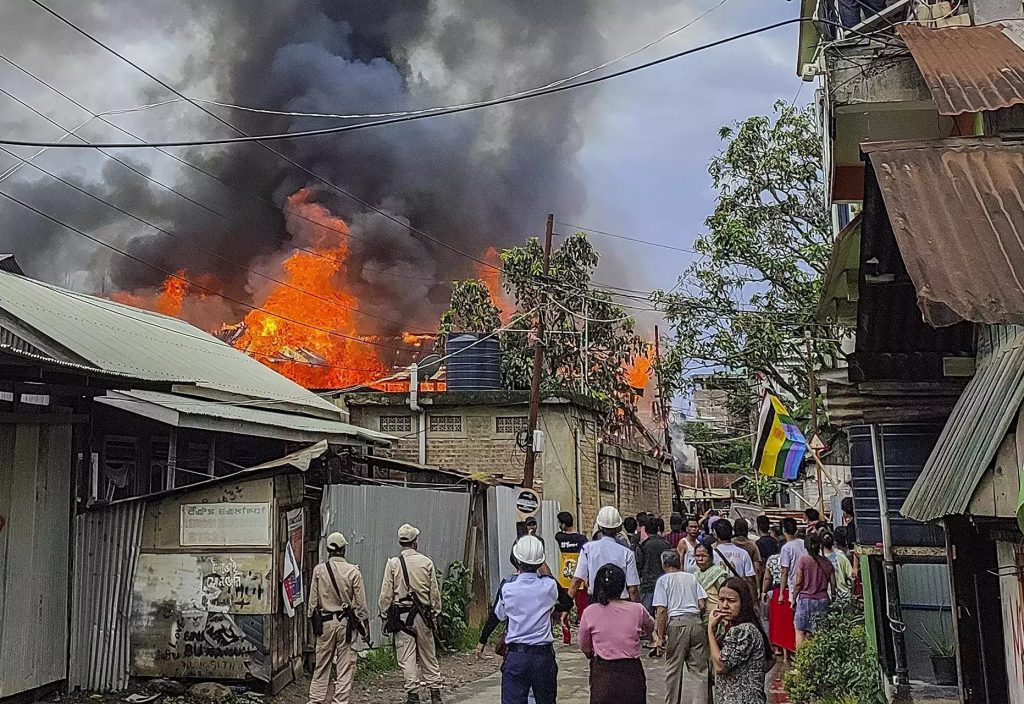
The state has been in the grip of violence for nearly two months, with over one hundred lives lost and thousands of families rendered homeless. There is a need to address sense of insecurity among Meiteis and also lend ear to the concerns of the Kuki community, writes nava thakuria
Manipur has been burning for nearly two months, killing over one hundred people and rendering thousands of families homeless after more than 9000 houses were burnt down by miscreants. The north-eastern State continues to witness stray violent incidents following the growing
conflicts between the Meitei and Kuki ethnic groups. The tiny state turned into a volatile place of India on 3 May, when an incident of violence broke out at Churachandpur locality. It spread to other parts of Manipur very quickly and till now one hundred people have lost their precious lives, a large volume of properties damaged, and thousands of local families directly affected as a result.
The tense situation surfaced since a section of Meitei people (mostly Hindus) started demanding the scheduled tribes (ST) status for them. Meanwhile, the Manipur High Court on March 27 directed the State government in Imphal to consider the ST status for the Meiteis, who constitute nearly half of the State population. Mostly confined in Imphal valley, the Meiteis remain dominant in all sectors of Manipur like sports, literature, theatre, cinema, education and even the media.
The directive was strongly opposed by the Kuki people (mostly Christians), who apprehended that it would enable the socio-economically empowered Meiteis to buy land in the surrounding hilly areas. Otherwise, the Meiteis are not permitted to own land in
hills, whereas the Kuki, Naga and other tribes can buy land in Imphal valley too. Kuki leaders argued that their people will be marginalized once the Meiteis enjoy the ST status as they are advanced many folds than the other ethnic groups.
As the State experienced unprecedented violence for weeks, the central security forces have been deployed in various sensitive localities. Appeals have been made to maintain peace and tranquility across Manipur. Lately, Rashtriya Swayamsevak Sangh (ideologue of the ruling
Bharatiya Janata Party both in New Delhi and Imphal) appealed for peace and harmony among various communities and also urged all concerned stakeholders to initiate steps for ensuring a seamless supply of relief materials to the displaced families.
Terming the Manipur situation as worrisome, RSS Sar Karyavah (general secretary) Dattatreya Hosabale in a media communique commented, “It is very unfortunate that the spate of unrest and violence that erupted among those who have been living a peaceful life with mutual harmony and co-operation for centuries has not stopped.” He added the Sangh stands with the displaced persons and other victims of the Manipur crisis.
“RSS is of the considered opinion that there is no place for violence and hatred in a democratic setup, and also believes that the solution of any problem is possible only through mutual dialogue and expression of brotherhood in a peaceful atmosphere,” said Hosabale, adding that it should be resolved by addressing the sense of insecurity and helplessness among the Meiteis and genuine concerns of the Kuki community, simultaneously.
Asom Nagarik Samaj, a civil society group also appealed for peace in Manipur. Expressing its anguish at the continuing cycle of deaths and violence in the neighbouring state, the Assam-based forum urged all stakeholders to exercise restraint while reacting to the situation. It also criticised Prime Minister Narendra Modi for his silence over the Manipur situation and demanded a proactive initiative to end the vicious cycle of destruction there at the earliest.
However, many political observers believe that the Manipur situation cannot be described as a simple ethnic conflict between two groups of residents, which was stimulated by the recent demand by the Kuki people for a separate administration or a Union territory carved out of Manipur. The return of normalcy to the State, adjacent to northern Myanmar, may take a longer time as the Meiteis will strongly oppose the move (as they had done in case of pro-Nagalim movement).
Rinku Khumukcham, an Imphal-based journalist, analyzed that the Kuki National Front (KNF), an armed group, has not been waging a war against the Union government in New Delhi. Even though the rebel group demands a separate land for Kuki people, it has cultivated a ‘good relationship’ with the army and paramilitary forces. He also stated that the KNF operating in Chittagong hill-tracts of Bangladesh maintains its demand for a separate territory.
“Similarly, the Kuki National Army is raising voices for a separate state inside Myanmar. At this juncture, what the authority of India needs to understand is the demand put up to the notice of the United Nations for formation of the Zogam (Zalengam) State by carving out
portions of land from India, Myanmar and Bangladesh by an organization spearheading the ongoing conflict in Manipur called the Zo Reunification Organisation,” said Khumukcham.
Amidst all troubles, an Assamese newspaper found a fake news to seemingly propagate more hatred among the people of northeast India. The daily published a wrong news-photograph to describe the horrible stories from Manipur on its front page of 19 June 2023 issue. But the
conscious social media users instantly picked up the fake content and slammed the acclaimed daily. They tracked the origin of the disturbing news content in a viral video that was used in a completely different context by the daily.
The small video clipping, where a young lady was seen repeatedly tortured on a roadside and finally shot down by some armed people in camouflage attires, was generated from Myanmar a few months back. But the daily reported the incident as being taking place in Manipur
recently, where the victim (read a Kuki lady) was targeted by those aggressive individuals (projected as Meitei armed group members). The report even compared the brutality revealed by the incident with that of Syria or Lebanon in recent years.
The published news has been confirmed to be related to a Myanmarese lady (identified as a local teacher named Aye Mar Tun) from Tamu locality of Sagaing region, who was killed on the suspicion of being a military informer. Myanmar’s influential media outlet Mizzima used the photograph a few months back with a news item relating to a statement of National League for Democracy (led by Daw Aung San Suu Kyi) about its investigation on alleged execution of the informer. The National Unity Government (of Myanmar) also decided to take strict action against any member of the People’s Defence Force (PDF) who were found
guilty of killing the lady.
Mizzima editor Soe Myint, while speaking to this writer from Yangon, confirmed that the photograph was related to the viral video, and it was published in his newspaper a few months back. He affirmed that the lady was a Burmese (not a Manipuri). The veteran journalist, who spent many years in New Delhi during the initial days of Mizzima, added that
nobody from Assam had earlier talked to him about the viral video or the particular photograph and its content.
Facing the heat, the editor of the concerned daily admitted that the photograph was incorrectly used in the newspaper to depict the Manipur situation. He even apologized to his readers for the mistake, while encountering brickbats from social media users if his editorial team had taken it granted for the readers to digest whatever they report.
Nonetheless, it’s amazing that a Guwahati-based daily has no source (be it the authority or media or common people) in its neighbouring State capital to authenticate information before using the troubling content with flowery language!











